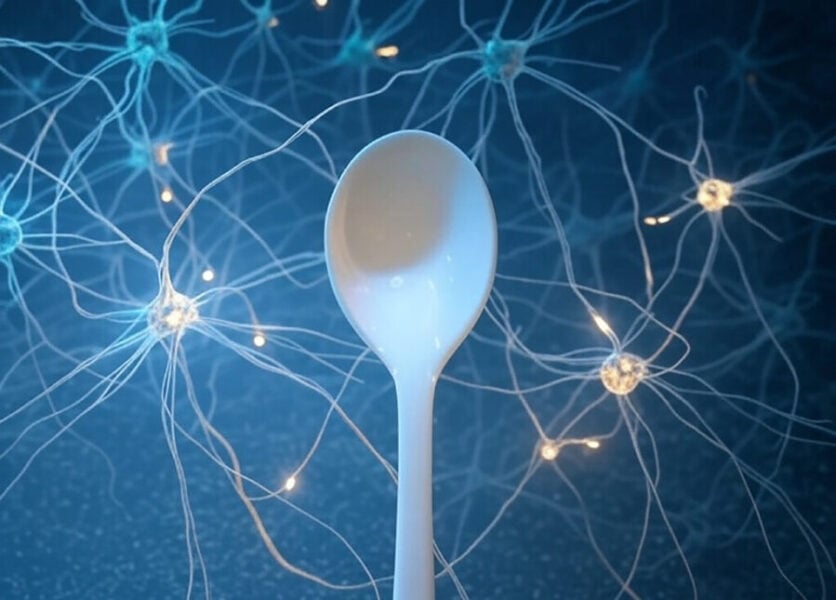Scientists have discovered that the human brain contains approximately a spoonful of microplastic particles, with significantly higher concentrations found in people with dementia. This alarming finding comes from a collection of four papers published in the May issue of Brain Medicine that examine the potential connection between ultra-processed foods, microplastic accumulation, and rising rates of brain disorders.
The research reveals that these tiny plastic fragments, many originating from food packaging and processing, can cross the blood-brain barrier—a defense mechanism once thought to protect our most vital organ from harmful substances. This discovery raises profound questions about how our modern lifestyle may be affecting our mental health in ways we’re only beginning to understand.
What happens when the materials we’ve engineered for convenience begin to occupy the very tissues responsible for our thoughts, memories, and emotions?
The Microplastic-Mental Health Connection
The featured viewpoint article, authored by Dr. Nicholas Fabiano from the University of Ottawa and colleagues, synthesizes emerging evidence connecting ultra-processed food consumption, microplastic exposure, and mental health outcomes.
“We’re seeing converging evidence that should concern us all,” explains Dr. Fabiano. “Ultra-processed foods now comprise more than 50% of energy intake in countries like the United States, and these foods contain significantly higher concentrations of microplastics than whole foods. Recent findings show these particles can cross the blood-brain barrier and accumulate in alarming quantities.”
The researchers cite substantial evidence linking ultra-processed food consumption with adverse mental health outcomes. According to their paper, recent studies found that people who consumed ultra-processed foods had a 22% higher risk of depression, 48% higher risk of anxiety, and 41% higher risk of poor sleep outcomes.
Key Findings from the Research
- Human brains contain approximately “a spoonful” of microplastic material
- Microplastic concentrations are 3-5 times higher in people with dementia
- Brain microplastic levels increased by about 50% between 2016 and 2024
- Ultra-processed foods like chicken nuggets contain 30 times more microplastics per gram than whole foods like chicken breasts
- Microwave heating of plastics releases millions of particles within minutes
- The biological mechanisms through which microplastics may harm brain health include inflammation, oxidative stress, and disruption of neurotransmitter systems
From Food Processing to Brain Accumulation
What makes this research particularly concerning is how it connects our changing food systems to brain health. The industrial processing of foods appears to significantly increase their microplastic content. For instance, the researchers note that chicken nuggets contain 30 times more microplastics per gram than chicken breasts.
The pathways by which these particles might harm the brain overlap remarkably with known mechanisms through which ultra-processed foods affect mental health—including inflammation, oxidative stress, disrupted neurotransmitter function, and mitochondrial dysfunction.
“This hypothesis is particularly compelling because we see remarkable overlap in biological mechanisms,” notes Dr. Wolfgang Marx from Deakin University’s Food & Mood Centre, one of the study authors. “Ultra-processed foods have been linked to adverse mental health through inflammation, oxidative stress, epigenetics, mitochondrial dysfunction, and disruptions to neurotransmitter systems. Microplastics appear to operate through remarkably similar pathways.”
Possible Solutions and Next Steps
The research collection doesn’t just sound an alarm—it also points toward potential solutions. One paper examines whether a medical procedure called therapeutic apheresis—which filters blood outside the body—might help remove microplastic particles from human circulation.
“While we need to reduce our exposure to microplastics through better food choices and packaging alternatives, we also need research into how to remove these particles from the human body,” notes Dr. Stefan Bornstein, author of the paper on apheresis. “Our early findings suggest that apheresis might offer one possible pathway for microplastic removal, though much more research is needed.”
The authors also recommend practical steps individuals can take to reduce exposure, such as choosing tap water over bottled water, avoiding heating food in plastic containers, and reducing consumption of ultra-processed foods.
A Paradigm Shift in Environmental Health
In a powerful editorial accompanying the research papers, Dr. Ma-Li Wong frames these findings as more than just a scientific warning—they represent a fundamental shift in how we must think about environmental contaminants and brain health.
“What emerges from this work is not a warning. It is a reckoning,” writes Dr. Wong. “The boundary between internal and external has failed. If microplastics cross the blood-brain barrier, what else do we think remains sacred?”
The issue’s striking cover image depicts a human brain stippled with colorful microplastic particles alongside a plastic spoon—a visual representation of the approximately “spoonful” of plastic now found in human brains. The image isn’t meant to be artistic or abstract; it’s a stark visualization of scientific reality.
The researchers emphasize that while more studies are needed to fully understand this relationship, their analyses provide compelling reasons to reconsider our reliance on plastic packaging and ultra-processed foods. The potential link to rising rates of depression, anxiety, and dementia adds urgency to addressing what has become both an environmental and public health crisis.
“As the levels of ultra-processed foods, microplastics, and adverse mental health outcomes simultaneously rise, it is imperative that we further investigate this potential association,” concludes Dr. Fabiano. “After all, you are what you eat.”
If our reporting has informed or inspired you, please consider making a donation. Every contribution, no matter the size, empowers us to continue delivering accurate, engaging, and trustworthy science and medical news. Independent journalism requires time, effort, and resources—your support ensures we can keep uncovering the stories that matter most to you.
Join us in making knowledge accessible and impactful. Thank you for standing with us!

